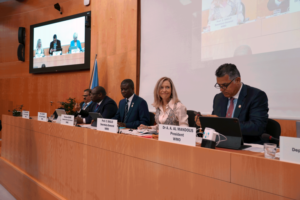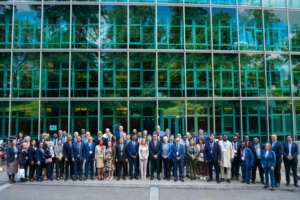The annual World Meteorological Organization (WMO) Executive Council meeting, which is taking place June 10-14, is prioritizing discussions on a detailed roadmap to provide early warnings against natural hazards and an implementation plan for a new Global Greenhouse Gas Watch initiative.
The meeting is also considering a raft of other measures, including: scaling up action on the cryosphere (ice and snow) in the face of rapid climate change; closing the gap in the global observing network; improving climate monitoring and climate services; and satellite and space weather programs.
“We just had the hottest 12-month period on record and a recent WMO report makes it clear that the record-breaking warming path is likely to continue over the next five years. Alarmingly, a new US report shows that carbon dioxide is accumulating in the atmosphere faster than ever — accelerating on a steep rise to levels far above any experienced during human existence. We are heading in the wrong direction,” said WMO Secretary-General Celeste Saulo. “As the UN Secretary-General says, we are playing Russian roulette with our planet.”
“Climate change impacts and more extreme weather are greatly increasing the need for strong National Meteorological and Hydrological Services. At the same time, rapid advances in satellite technology, supercomputing and artificial intelligence provide new and exciting possibilities to harness science for the benefit of society. We must seize the opportunities to meet the challenges,” said Saulo, who became WMO secretary-general at the start of 2024. “Every single day we are working to support the adaptation and mitigation agenda to support sustainable development.”

Early Warnings for All
The WMO Road Map for the Early Warnings for All initiative outlines the vision, objectives and actions to enhance the delivery and use of multi-hazard early warning systems for weather-, climate-, and water-related hazards. It covers the period from 2024-2027 with detailed dates and deliverables. This is in line with the target date set by United Nations Secretary-General, António Guterres.
However, according to the WMO, major gaps still exist in the deployment of early warning systems, especially in small island developing states and least-developed countries. Some 70% of all deaths from climate-related disasters have occurred in the 46 poorest countries over the past 50 years.
“Making Early Warnings For All a reality remains far from reach, with millions, especially in developing nations, lacking access to life-saving early warnings. Strong early warning systems require stronger political and policy support from the international community and governments, in addition to significant investment in infrastructure, technology and training,” said WMO president Abdulla Al Mandous.
“We must all champion Early Warnings For All globally, advocating for increased investment and political will. Together, we can turn Early Warnings for All into a reality, saving lives and building resilience in a changing climate,” he said in an opening address.
The Early Warnings for All initiative is co-led by WMO and the United Nations Office for Disaster Risk Reduction (UNDRR), with support from the International Telecommunication Union (ITU), the International Federation of Red Cross and Red Crescent Societies (IFRC) and other partners.
During the four-day meeting, the WMO will discuss its aims to close critical gaps among WMO members and territories. These include: the fact that only a third of WMO members and territories report having a multi-hazard monitoring and forecasting system; critical gaps in surface and upper air meteorological observations across Africa, parts of the Pacific and West of Latin America; the fact that 67% of WMO members report having warning and alerting services available 24/7; and the fact that of the 30 countries initially selected for Early Warnings for All coordinated assistance, half of the National Meteorological and Hydrological Services (NMHS) currently operate with basic monitoring and forecasting capacity and close to a quarter with less-than-basic capacity.
The roadmap seeks to leverage the entire WMO network and enhance the capabilities of its NMHSs to protect lives and livelihoods. WMO members have already endorsed the structure underpinning the priority activities, with defined roles and responsibilities. At the annual meeting, the Executive Council will examine the strategic rollout plan consisting of two pivotal phases: the catalytic phase and the sustained action phase.
During the catalytic phase, countries identify gaps and mobilize stakeholders to accelerate universal multi-hazard early warning system coverage through national road maps. This will be followed by the sustained action phase, which focuses on collectively implementing road maps and enhancing capabilities.
Although 30 focus countries have been prioritized, the initiative is being expanded to other countries in order to meet the demand and need. The roadmap will guide WMO as it seeks to scale up and accelerate actions.
To date, 22 countries have held their national EW4All workshops, demonstrating their commitment to fulfill the goal of universal MHEWS coverage by 2027. In 2024, 14 more workshops are planned. Additionally, an EW4All Dashboard was launched at COP28, providing transparent and continual monitoring of progress on the initiative.
Global Greenhouse Gas Watch
The annual World Meteorological Organization (WMO) Executive Council meeting is also discussing an implementation plan for a new Global Greenhouse Gas Watch initiative.
The initial focus will be on the three most important greenhouse gases influenced by human activities – carbon dioxide, methane and nitrous oxide. This initiative takes into consideration both human and natural influences on the levels of greenhouse gases in the atmosphere. The system will be built on the basis of the long-term efforts of WMO in the coordination of greenhouse gas observations and research.

Credit: WMO
The WMO Infrastructure Commission (INFCOM) approved the Global Greenhouse Gas Watch Draft Implementation Plan at its session in April 2024. This will now be discussed by Executive Council.
The draft Executive Council resolution recommends any greenhouse gas monitoring to be carried out with “full transparency,” in accordance with WMO’s fundamental policy for free and unrestricted international exchange of Earth system data.
Specifically, it aims at further strengthening collaboration and coordination with relevant UN agencies and other international partners engaged in greenhouse gas monitoring and modeling activities, mobilizing partner resources and ensuring equal access for all members to WMO resources, including means to ensure global comparability of GHG monitoring data.
It stresses the need for engagement with stakeholders at international forums, such as the Conference of the Parties to UNFCCC (COP), to promote the uptake and use of the data and products generated by this infrastructure.
The resolution envisages a joint advisory group, co-chaired by INFCOM and the WMO Research Board, to guide the implementation of the plan, with the appropriate involvement of external stakeholders.
For more of the top insights into the WMO’s sustainable observing systems, read Meteorological Technology International’s exclusive feature “How is the WMO developing more environmentally sustainable observing systems?”, here.



